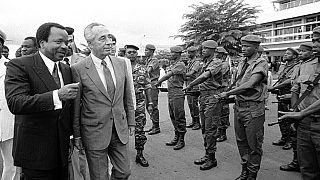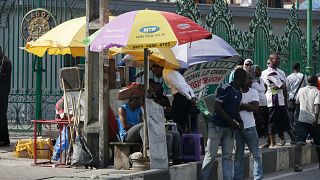Cameroon
At least two people have been reported killed in the Cameroonian city of Bamenda, capital of the North West province, during a confrontation between protesters and security forces on Thursday.
The clashes broke out after protesters set up barricades to prevent a rally by president Paul Biya’s party from taking place.
The North West and South West provinces, Cameroon’s only English-speaking areas, have been witnessing protests in recent days with people calling for an end to the use of French and perceived disenfranchisement.
Some groups have been calling for a return to a federal state system. Others have called for the breakaway of the North West and South West provinces and the restoration of the so-called “Southern Cameroons” or Ambazonia, which was a British mandate during colonisation.
On Monday, thousands of teachers and lawyers in the English-speaking regions went on strike, accusing the government of trying to marginalise them by imposing the French language on their schools and courts.
Some 5,000 people, according to the police, demonstrated in Buéa, the capital of the South-West, one of the two English-speaking regions of Cameroon’s 22 million inhabitants, after the heeded calls from the Social Democratic Front (SDF), one of the main opposition parties.
MPs and SDF activists expressed their solidarity with Anglophone teachers and lawyers who feel marginalized by the Francophone majority.
They also denounced the injustices suffered by lawyers, teachers and English-speaking students since the beginning of their sling at the end of November.
Many of the protesters demanded a return to federalism in Cameroon, as was the case between 1961 and 1972.
Areas controlled by Britain and France joined to form Cameroon after the colonial powers withdrew in the 1960s.
Cameroon was initially a German colony, before it was split into two by the League of Nations after the First World War (1914-18): one part was under French tutelage and another part, close to Nigeria, under the British mandate.
In 1960, French Cameroon gained independence. A year later, a portion of the Anglophones decided through a referendum to join Cameroon. As a result, the country now has 10 semi-autonomous administrative regions: eight are Francophone, while the North and Southwest regions are home to approximately five million English speakers.
Federalism was then established in the country between 1961 and 1972, but the first president Ahmadou Ahidjo proclaimed the United Republic in 1972.













01:00
'Good Trouble’ rallies across US push back on Trump agenda
Go to video
"Enough Is Enough": Liberians protest for justice, jobs, and accountability
Go to video
Almost 300 killed in wave of violence in Sudan’s North Kordofan
01:11
World leaders express condolences over death of Nigerian ex-president Muhammadu Buhari
00:58
Cameroon: Presidential election set for October 12
02:55
In Cameroon, Paul Biya's candidacy divides his party